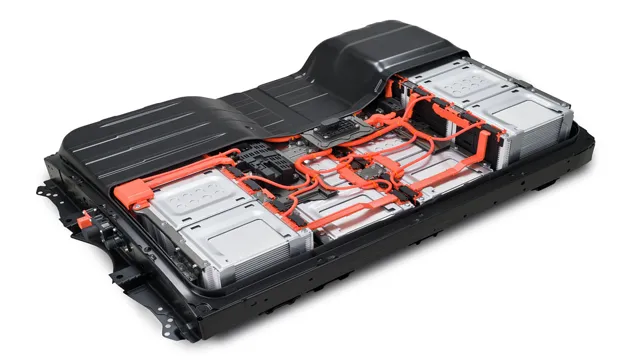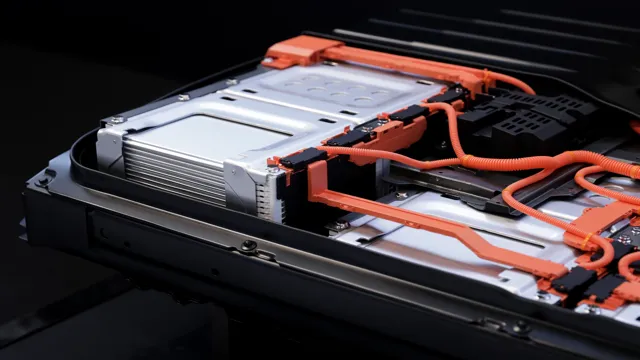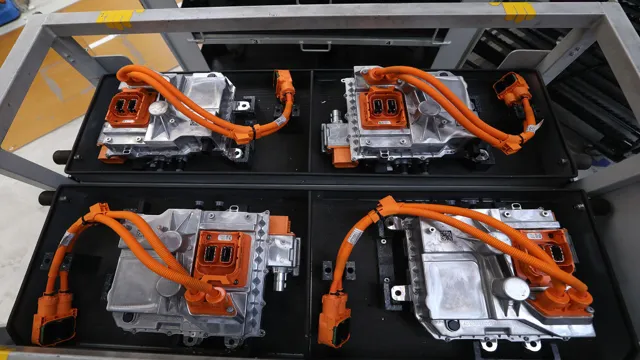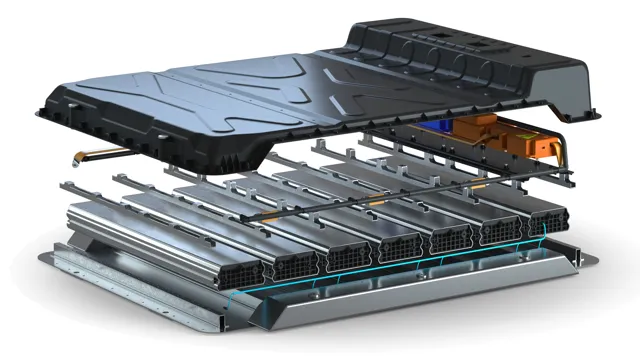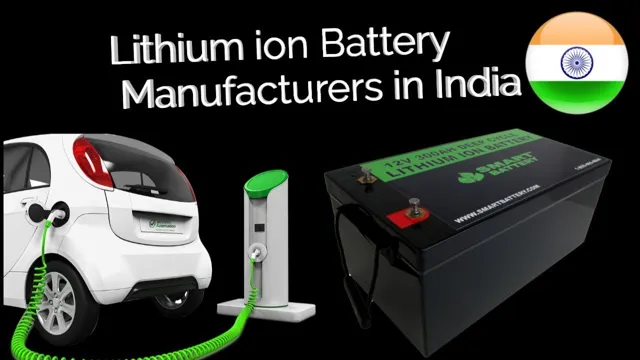Revolutionizing Transportation: Exploring the Impact of Electric Car Battery Pack Weight on Efficiency and Performance
Electric cars have gained immense popularity in recent years due to their environmentally-friendly nature and high fuel efficiency. These vehicles have revolutionized the automotive industry and have become a popular choice for consumers who wish to reduce their carbon footprint. However, one of the main concerns with electric cars is the battery pack weight.
The battery pack is the heaviest component of an electric car, and most people wonder how much it weighs and how it affects the overall weight of the vehicle. The weight of the battery pack plays a vital role in the performance and efficiency of the electric car. It impacts the driving range, acceleration, and handling of the vehicle.
The battery pack weight also affects the safety of the car in terms of stability and crash protection. Due to this, automakers have invested heavily in developing lighter and smaller battery packs that can provide the same performance as heavy ones. In this blog, we will explore the weight of electric car battery packs, how it impacts the car’s performance, and how automakers are developing lighter battery technology.
We will also look at the future of electric cars and the likelihood of further reducing battery pack weight. By the end of this blog, you’ll have a better understanding of the importance of battery pack weight in electric cars and what changes to expect in the years ahead.
What Makes Up an Electric Car Battery Pack?
The weight of an electric car battery pack can vary depending on the type of vehicle, but they generally weigh anywhere from a few hundred pounds to over a thousand pounds. The battery pack typically consists of several individual lithium-ion battery cells that are connected together to form a larger unit. These cells come in different sizes and capacities and are arranged in a way that allows them to provide the power needed to drive an electric car.
Additionally, other components such as cooling systems and electronic control units are also included in the battery pack to ensure it functions properly. It’s important to note that the weight of an electric car battery pack can impact the overall weight of the vehicle and may affect its performance and range. Manufacturers are always looking for ways to reduce the weight of battery packs to improve efficiency and address range-anxiety among consumers.
Composition of Cell Modules and Thermal Management System
The electric car battery pack is made up of various components, including individual cells, modules, and a thermal management system. The individual cells are the building blocks of the battery pack and are connected in series and parallel to provide the required voltage and power. Groups of cells make up modules that are used to increase the overall voltage and power output of the battery pack.
The thermal management system is responsible for maintaining the temperature of the battery pack within safe operating limits. It consists of cooling and heating elements that prevent the battery from overheating or freezing, which can cause damage to the cells and reduce their lifespan. In summary, the composition of an electric car battery pack is critical to its performance, longevity, and safety.
The quality of its individual components and the efficiency of its thermal management system are all factors that determine the overall reliability and efficiency of the battery pack.
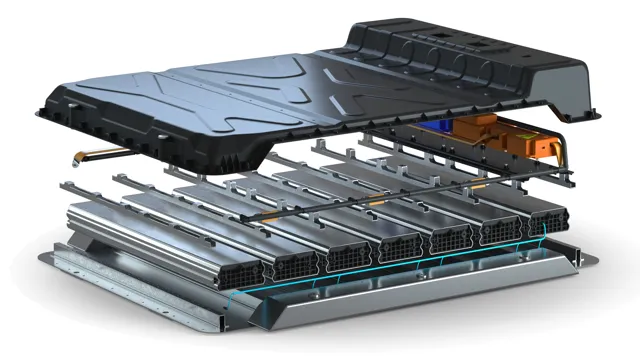
Battery Management System and Charger
An electric car battery pack is made up of numerous individual battery cells connected together in a series. These cells are often lithium-ion batteries, which are known for their high energy density and long cycle life. The battery pack also includes a battery management system (BMS) that monitors and controls the performance of each individual cell, ensuring that they are all operating safely and efficiently.
The BMS is responsible for balancing the charge between cells, preventing overcharging or overheating, and controlling the discharge rate. It also provides critical information to the driver about the battery’s state of charge and estimated range. Additionally, an electric car battery pack needs a charger to replenish the energy in the cells after use.
The charger transforms AC power from a charging station or wall outlet into DC power for the battery pack. The charging rate can vary depending on the battery pack’s capacity and the level of charge in the cells. Overall, these components make up the essential elements of an electric car battery pack, ensuring that it provides reliable and efficient power to the vehicle.
How Heavy Are Electric Car Battery Packs?
If you’re interested in buying an electric car, you may be wondering how heavy the battery pack is. The weight of an electric car battery pack varies depending on the make and model. In general, they can weigh anywhere from 500 to 1,200 pounds.
The battery pack is usually located in the floor of the vehicle, which helps with handling and stability because it lowers the center of gravity. It’s important to keep in mind that although the battery pack does add weight to the vehicle, it also provides the power needed for the car to run. The weight of the battery pack has also decreased in recent years as technology has improved, leading to longer driving ranges and lighter overall vehicles.
Overall, the weight of the battery pack is something to consider when researching electric cars, but it’s not the only factor to keep in mind.
Range of Battery Pack Weights Across Different Models
As the adoption of electric vehicles continues to spread, people are curious about how heavy electric car battery packs are. The weight of EV batteries varies across different models based on factors such as the size, capacity, and chemistry of the battery. On average, electric car battery packs can weigh anywhere from 500 to 1,200 pounds (227 to 544 kilograms).
For example, the Tesla Model 3 has a battery pack weighing roughly 1,000 pounds (453 kilograms), while the Nissan Leaf’s battery is much lighter, weighing in at about 400 pounds (181 kilograms). Although the weight of the battery can impact the driving range and handling of the vehicle, manufacturers are working to develop lighter and more efficient batteries that could lead to longer driving ranges and reduced environmental impact.
Factors That Affect Battery Pack Weight
When it comes to electric cars, battery pack weight is an important factor to consider. The weight of an electric car battery pack can vary greatly depending on several factors. Firstly, the size of the battery pack will have a big impact on its weight.
Generally, the larger the battery capacity, the heavier the battery pack will be. Another factor that affects battery pack weight is the type of battery used. Lithium-ion batteries are commonly used in electric cars because they offer a good balance of energy density, weight, and cost.
However, other battery types, such as nickel-metal hydride or solid-state batteries, may also be used, and their weight can differ significantly. Additionally, the number of cells in the battery pack will determine its weight. Lastly, the overall design of the car can have an impact on battery pack weight.
Some cars may be designed to accommodate larger battery packs, while others may have more limited space and therefore need smaller battery packs. All these factors ultimately impact the electric car’s range, performance, and driving dynamics.
Comparison of Electric Car Battery Pack Weights to Gasoline Cars
When comparing electric cars to gasoline cars, one important aspect that often comes up is the weight of their respective battery packs. Electric cars require large battery packs to store their power, and these can be quite heavy. However, this weight can vary greatly from model to model.
For example, a Tesla Model S with its 100 kWh battery pack weighs around 1,200 pounds, while a Nissan Leaf with its 40 kWh battery pack weighs about 600 pounds. In contrast, a traditional gasoline car typically has a much smaller battery that only powers the starter motor and other small systems, and thus weighs significantly less. This weight difference is not necessarily a bad thing, however, as the battery packs in electric cars often provide added stability and lower centers of gravity, which can improve handling and overall safety on the road.
So while electric car battery packs can be heavy, they also bring a number of benefits that more than make up for their added weight.
Why Does Battery Pack Weight Matter in Electric Cars?
Electric car battery pack weight is a crucial factor in determining the overall efficiency and performance of an electric car. The battery pack is the heart of an electric vehicle, providing power to the electric motor and other essential parts of the car. The heavier the battery pack, the greater the energy required to move the car, decreasing the car’s efficiency and range.
On the other hand, a lighter battery pack allows for better acceleration and handling, resulting in a more enjoyable driving experience. Additionally, a lighter battery pack reduces the strain on the car’s suspension system, tires, and brakes, increasing their lifespan over time. The goal of electric car manufacturers is to find the perfect balance between weight, cost, and performance to provide consumers with the best electric car experience possible.
By using lightweight materials and advanced battery engineering, manufacturers can reduce the battery’s weight while still providing adequate power and range. Ultimately, the battery pack weight is a crucial factor in the future of electric cars, as it affects not only the car’s performance but also its affordability and eco-friendliness.
Impact on Overall Vehicle Performance and Range
Battery pack weight is a critical factor that affects the performance and range of electric cars. The heavier the battery, the more energy is required to move the vehicle, which can lead to a significant reduction in the overall range. In addition, a heavier battery can also impact the handling, acceleration, and braking of the vehicle.
When designing an electric car, manufacturers need to balance the battery pack weight with the powertrain and other components to ensure optimal performance and efficiency. This is why many manufacturers are investing heavily in research and development to develop lightweight and efficient battery technologies that can help improve the range and performance of electric vehicles. Ultimately, the weight of the battery pack is an important consideration that can significantly impact the overall performance and range of electric cars, and it will continue to be a key area of focus for manufacturers as they work to improve the technology.
Efforts to Reduce Weight and Improve Efficiency of Electric Car Battery Packs
When it comes to electric cars, battery pack weight plays a significant role in their success and efficiency. The weight of the battery pack affects how far the car can travel on a single charge, how well it handles, and its overall performance. This is because a heavier battery pack requires more energy to move the car, which drains the battery faster and reduces its range.
Additionally, because the battery pack accounts for a substantial portion of the car’s weight, reducing its weight can also improve the car’s handling and responsiveness. That’s why car manufacturers are constantly searching for ways to make the batteries lighter and more efficient, such as using different materials, optimizing the battery cell design, and improving the cooling system. Ultimately, reducing the weight of the battery pack can go a long way in making electric cars more viable and efficient for everyday use.
Conclusion
In the world of electric cars, it’s often said that “bigger is better” when it comes to batteries. But with larger batteries comes an increase in weight, which can affect everything from handling to overall efficiency. So, when it comes to electric car battery pack weight, the key is finding the sweet spot between size and heft.
After all, a car that’s too heavy can be a real drag, but a battery that’s too small won’t get you very far. So, here’s to striking the perfect balance and keeping our electric cars humming along, weight and all!”
FAQs
What is the average weight of an electric car battery pack?
The weight of an electric car battery pack typically ranges from 500 to 1,000 pounds, depending on the make and model of the vehicle.
How does the weight of an electric car battery pack affect the vehicle’s performance?
The weight of an electric car battery pack can have a significant impact on the vehicle’s performance, particularly in terms of range and acceleration. Heavier battery packs may reduce the range of the vehicle, while also decreasing acceleration and top speed.
Are there ways to reduce the weight of an electric car battery pack?
Yes, manufacturers are constantly researching and developing new technologies to reduce the weight of electric car battery packs. Some strategies include using lighter materials in the battery casing, reducing the size of individual battery cells, and improving the efficiency of the battery management system.
Can the weight of an electric car battery pack impact the safety of the vehicle?
Yes, the weight distribution of an electric car battery pack can impact the overall stability and handling of the vehicle. Manufacturers must carefully design and engineer the battery pack to ensure that it doesn’t adversely affect the safety of the vehicle or its occupants.
